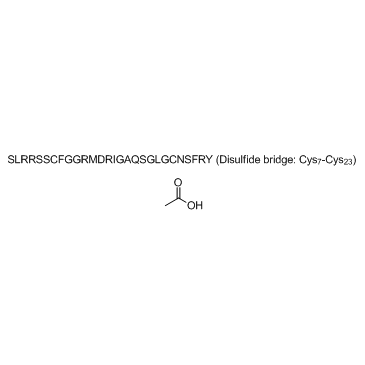Atrial Natriuretic Peptide (ANP) (1-28), human, porcine Acetate (Synonyms: Atrial Natriuretic Peptide (ANP) (1-28), human, porcine acetate) |
| Catalog No.GC34025 |
L'acétate de peptide natriurétique auriculaire (ANP) (1-28), humain, porcin (l'acétate de peptide natriurétique auriculaire (ANP) (1-28), humain, porcin) est une hormone de 28 acides aminés, qui est normalement produite et sécrétée par le cœur humain en réponse À une lésion cardiaque et À un étirement mécanique.
Products are for research use only. Not for human use. We do not sell to patients.

Cas No.: 1366000-58-9
Sample solution is provided at 25 µL, 10mM.
Atrial Natriuretic Peptide (ANP) (1-28), human, porcine is a 28-amino acid hormone, that is normally produced and secreted by the human heart in response to cardiac injury and mechanical stretch. ANP (1-28) inhibits endothelin-1 secretion in a dose-dependent way.
Atrial natriuretic peptide (ANP) is a diuretic, natriuretic, and vasodilatory peptide hormone originally isolated from mammalian hearts. In cultured porcine endothelial cells the inhibition by porcine ANP (1-28) of immunoreactive endothelin-1 secretion after stimulation with Angiotensin II (Ang II) is paralleled by an increase in the cellular cGMP level. Porcine ANP (1-28) strongly inhibits immunoreactive endothelin-1 secretion in porcine aorta after stimulation with Ang II[1]. ANP is a cardiac hormone involved in electrolyte and fluid homeostasis. The inhibition by ANP of endothelin-1 secretion stimulated by angiotensin II (ANGII) and thrombin using cultured human umbilical-vein endothelial cells. Human ANP (1-28) inhibits immunoreactive (ir)-endothelin-1 secretion and increases cyclic GMP in the human umbilical-vein endothelial cells[2]. In glomeruli from normal rats, Human 125I-ANP (1-28) binds to a single population of high affinity receptors with a mean equilibrium dissociation constant of 0.46 nM. Human ANP (1-28) binds to the glomerular ANP receptor with high affinity stimulated cGMP accumulation. Human ANP (1-28) markedly stimulates cGMP generation, but not cAMP generation in normal rat glomeruli[3].
[1]. Kohno M, et al. Atrial and brain natriuretic peptides inhibit the endothelin-1 secretory response to angiotensin II in porcine aorta. Circ Res. 1992 Feb;70(2):241-7. [2]. Kohno M, et al. Inhibition by atrial and brain natriuretic peptides of endothelin-1 secretion after stimulation with angiotensin II and thrombin of cultured human endothelial cells. J Clin Invest. 1991 Jun;87(6):1999-2004. [3]. Ballermann BJ, et al. Physiologic regulation of atrial natriuretic peptide receptors in rat renal glomeruli. J Clin Invest. 1985 Dec;76(6):2049-56.
Average Rating: 5 (Based on Reviews and 34 reference(s) in Google Scholar.)
GLPBIO products are for RESEARCH USE ONLY. Please make sure your review or question is research based.
Required fields are marked with *




















